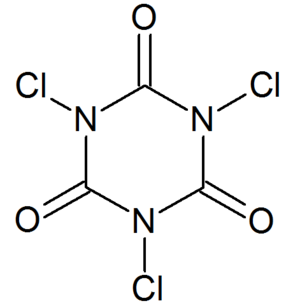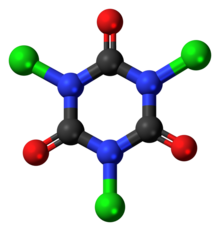Trichloroisocyanuric acid
Trichloroisocyanuric acid (abbreviated TCCA) is a useful chlorinating agent and is commonly used to produce chlorine gas.
Contents
Properties
Chemical
TCCA is basically insoluble in water. On addition to hydrochloric acid, it looses chlorine to become cyanuric acid.
Reaction with ammonia produces chloroamines.
Producing chlorine
The reaction between it and hydrochloric acid is favorable for a few reasons.
1) For a given amount of TCCA, it produces a lot of chlorine, more so than other methods.
2) The reaction is slow and steady, not releasing all its chlorine at once in a violent and foaming reaction as is often the case with calcium hypochlorite. A more violent reaction is also more likely to bring over water vapor and HCl fumes, as well as creating an inhalation hazard, which is generally unfavorable.
3) The solid comes in easy to handle blocks that can be broken down to suitable sized chunks or a powder.
4) All the reactants and products are easy to clean from glassware, unlike manganese dioxide.
5) TCCA is usually cheap, especially when bought in bulk, so the cost per amount of chlorine produced is very low.
Physical
A white solid that has an odor similar to chlorine itself, it is often sold in big white circular 'tablets'.
Availability
It is available in a quite pure form in many countries as a slow chlorinating agents for swimming pools. It can be purchased online too, where it is usually quite cheap.
Preparation
TCCA can not be made easily, nor is it often desired to be due to its wide availability and alternatives if it can not be found. It can be made by clorinating cyanuric acid.
Projects
- Producing chlorine gas
- Copper cyanurate
- Making singlet oxygen
Safety
Gloves should be worn when dealing with TCCA and care should be taken to avoid breathing in any dust. TCCA spontaneously produces large volumes of toxic chlorine in many reactions, so safety plans that dramatically reduce the chlorine's danger to you should in place when dealing with this chemical.
References
Tdep.

